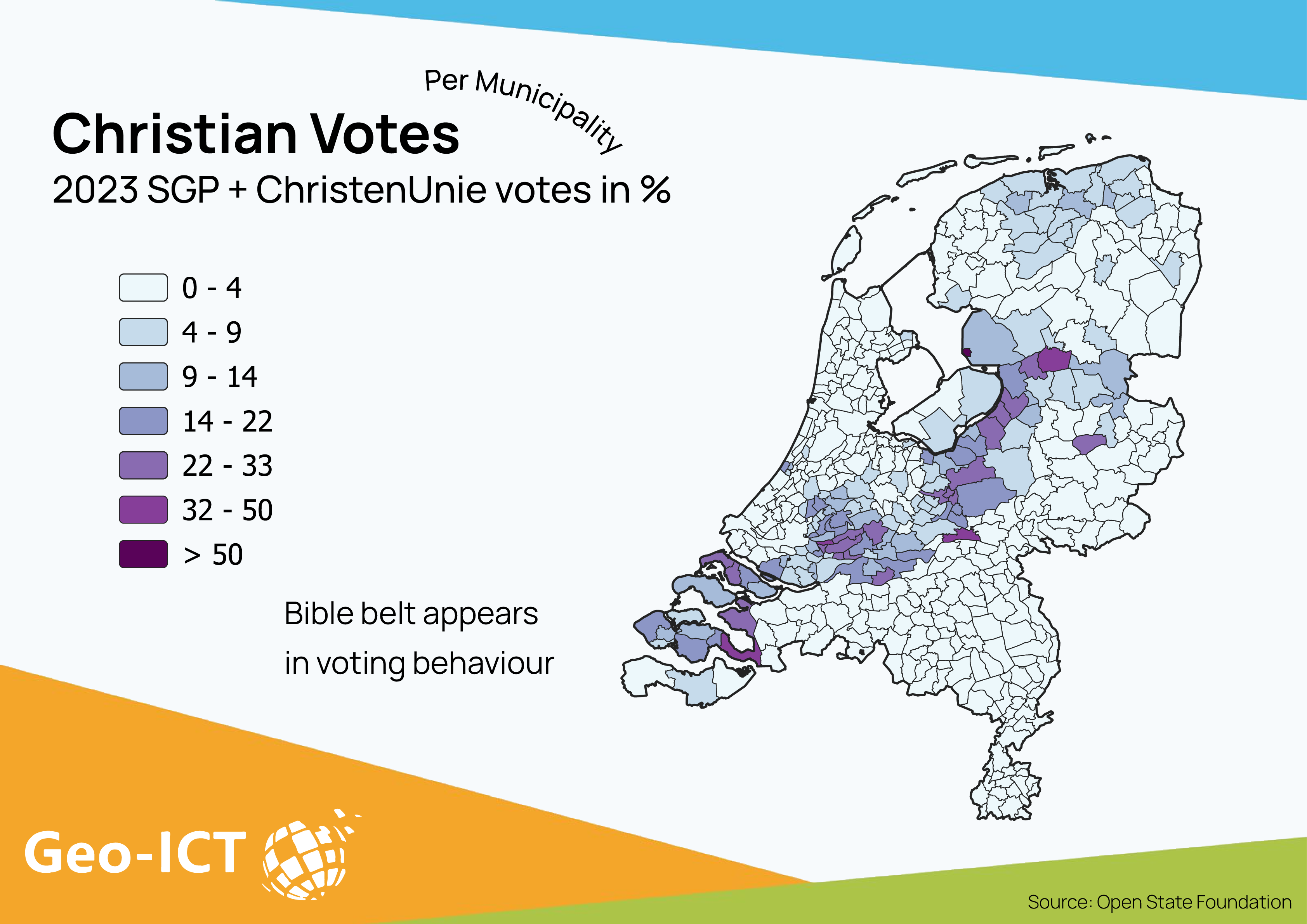Christian Votes Map in Dutch 2023 Elections


Marcus Rodriguez
Historical Geography Expert
Marcus Rodriguez specializes in historical cartography and geographic data analysis. With a background in both history and geography, he brings unique...
Geographic Analysis
What This Map Shows
This map visualizes the distribution of Christian votes in the Dutch 2023 elections, highlighting regions where Christian political parties garnered significant support. It showcases the geographical concentration of voters who align with Christian values, particularly in the Netherlands' well-known Bible Belt. This area, stretching from Zeeland in the southwest to parts of Overijssel and Gelderland in the northeast, is characterized by a strong adherence to conservative Christian beliefs, which profoundly influence political preferences.
Deep Dive into Christian Voting Trends
The phenomenon of Christian voting in the Netherlands is deeply rooted in the country’s history and cultural landscape. The Bible Belt, an area where evangelical and orthodox Protestant communities are prevalent, has consistently shown a distinct voting behavior compared to more liberal urban centers. In the 2023 elections, Christian parties like the SGP (Reformed Political Party) and the CU (Christian Union) have historically received a substantial portion of votes from this demographic.
Interestingly, the Bible Belt encompasses a mosaic of beliefs, including Reformed, Evangelical, and Roman Catholic communities, each contributing to the political landscape in unique ways. For instance, the SGP is particularly strong in the northern parts of the Bible Belt, while the CU has found broader appeal among more moderate Christian voters across the region. According to data from the recent elections, the SGP achieved around 4% of the national vote, with numbers significantly higher within the Bible Belt regions, reaching upwards of 20% in certain municipalities.
One notable trend is the increasing engagement of younger voters within these communities. Traditionally, Christian parties have relied heavily on older demographics; however, there is a growing movement among younger Christians to participate in politics, advocating for issues such as climate change, social justice, and economic equality, thus potentially reshaping the priorities of these parties.
Moreover, the interplay between religion and politics in the Netherlands is not just a matter of affiliation; it also influences policy-making. Issues such as education, healthcare, and family rights are often viewed through a religious lens, affecting legislation and public discourse. This can create a significant divide between Bible Belt regions and more secular urban areas like Amsterdam and Rotterdam, where progressive policies dominate.
Regional Analysis
Examining the map reveals fascinating regional variations in Christian voting patterns across the Netherlands. For instance, in the municipality of Urk, which is renowned for its strong Reformed community, the SGP received an overwhelming majority of votes, around 60%. In contrast, cities such as Utrecht and The Hague, which boast more diverse populations and progressive values, showed minimal support for Christian parties, often below 10%.
The provinces of Gelderland and Overijssel, which contain some of the heartlands of the Bible Belt, exhibit a strong correlation between the density of conservative Christian communities and voting outcomes. In contrast, in provinces like North Holland, where urbanization and secularization are more pronounced, the appeal of Christian parties diminishes significantly.
Interestingly, the dynamics of local issues also play a crucial role in these elections. For example, debates surrounding agricultural policies resonate strongly in rural Bible Belt areas, where many communities are deeply connected to farming and traditional lifestyles. This often translates into greater support for parties that advocate for Christian values aligned with rural interests, showcasing the intersection of faith and local economic concerns.
Significance and Impact
Understanding the voting patterns of Christian communities in the Netherlands is essential for several reasons. Firstly, it highlights the enduring influence of religion in a predominantly secular society, raising questions about the future of political pluralism and the role of faith in public life. As the demographics of the Netherlands continue to evolve, the challenge for Christian parties will be to adapt their messages to resonate with a younger, more diverse electorate.
Moreover, the rise of more progressive Christian voices within these communities could signal a shift in the political landscape, potentially leading to new alliances and coalitions that bridge traditional divides. This could have profound implications for national policies, especially in areas like education and social services, where differing values come into play.
As we look ahead, it's crucial to monitor how these trends develop. Will Christian parties maintain their historical stronghold in the Bible Belt, or will emerging issues and changing demographics reshape their influence? The answers could redefine not only the political landscape of the Netherlands but also the broader conversation about the role of faith in contemporary governance.
Visualization Details
- Published
- October 21, 2025
- Views
- 18
Comments
Loading comments...